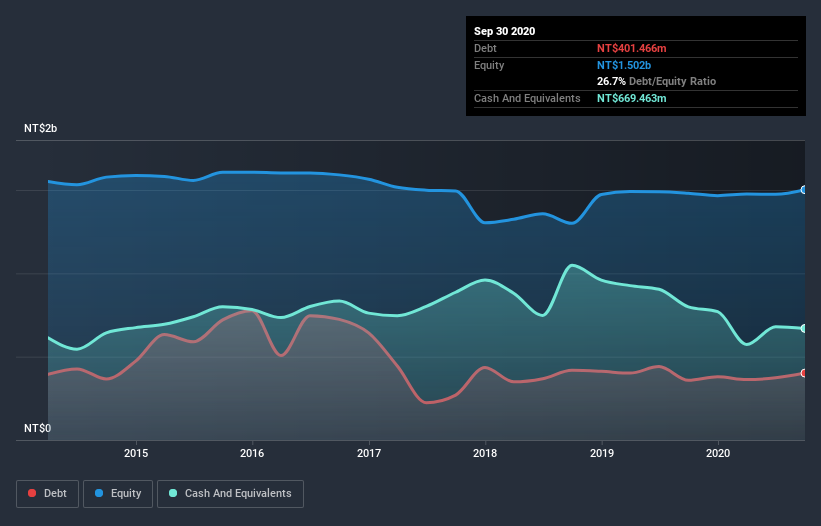Warren Buffett famously said, 'Volatility is far from synonymous with risk.' When we think about how risky a company is, we always like to look at its use of debt, since debt overload can lead to ruin. We note that Billion Electric Co., Ltd. (TPE:3027) does have debt on its balance sheet. But the real question is whether this debt is making the company risky.
What Risk Does Debt Bring?
Debt and other liabilities become risky for a business when it cannot easily fulfill those obligations, either with free cash flow or by raising capital at an attractive price. In the worst case scenario, a company can go bankrupt if it cannot pay its creditors. However, a more usual (but still expensive) situation is where a company must dilute shareholders at a cheap share price simply to get debt under control. By replacing dilution, though, debt can be an extremely good tool for businesses that need capital to invest in growth at high rates of return. The first thing to do when considering how much debt a business uses is to look at its cash and debt together.
Check out our latest analysis for Billion Electric
What Is Billion Electric's Net Debt?
You can click the graphic below for the historical numbers, but it shows that as of September 2020 Billion Electric had NT$401.5m of debt, an increase on NT$358.6m, over one year. But on the other hand it also has NT$669.5m in cash, leading to a NT$268.0m net cash position.

A Look At Billion Electric's Liabilities
The latest balance sheet data shows that Billion Electric had liabilities of NT$699.5m due within a year, and liabilities of NT$197.0m falling due after that. Offsetting this, it had NT$669.5m in cash and NT$138.4m in receivables that were due within 12 months. So it has liabilities totalling NT$88.7m more than its cash and near-term receivables, combined.
Of course, Billion Electric has a market capitalization of NT$1.87b, so these liabilities are probably manageable. But there are sufficient liabilities that we would certainly recommend shareholders continue to monitor the balance sheet, going forward. Despite its noteworthy liabilities, Billion Electric boasts net cash, so it's fair to say it does not have a heavy debt load!
Although Billion Electric made a loss at the EBIT level, last year, it was also good to see that it generated NT$37m in EBIT over the last twelve months. The balance sheet is clearly the area to focus on when you are analysing debt. But you can't view debt in total isolation; since Billion Electric will need earnings to service that debt. So when considering debt, it's definitely worth looking at the earnings trend. Click here for an interactive snapshot.
Finally, a business needs free cash flow to pay off debt; accounting profits just don't cut it. While Billion Electric has net cash on its balance sheet, it's still worth taking a look at its ability to convert earnings before interest and tax (EBIT) to free cash flow, to help us understand how quickly it is building (or eroding) that cash balance. During the last year, Billion Electric burned a lot of cash. While investors are no doubt expecting a reversal of that situation in due course, it clearly does mean its use of debt is more risky.
Summing up
While it is always sensible to look at a company's total liabilities, it is very reassuring that Billion Electric has NT$268.0m in net cash. So we don't have any problem with Billion Electric's use of debt. The balance sheet is clearly the area to focus on when you are analysing debt. But ultimately, every company can contain risks that exist outside of the balance sheet. Case in point: We've spotted 3 warning signs for Billion Electric you should be aware of.
At the end of the day, it's often better to focus on companies that are free from net debt. You can access our special list of such companies (all with a track record of profit growth). It's free.
When trading Billion Electric or any other investment, use the platform considered by many to be the Professional's Gateway to the Worlds Market, Interactive Brokers. You get the lowest-cost* trading on stocks, options, futures, forex, bonds and funds worldwide from a single integrated account. Promoted
Valuation is complex, but we're here to simplify it.
Discover if Billion Electric might be undervalued or overvalued with our detailed analysis, featuring fair value estimates, potential risks, dividends, insider trades, and its financial condition.
Access Free AnalysisThis article by Simply Wall St is general in nature. It does not constitute a recommendation to buy or sell any stock, and does not take account of your objectives, or your financial situation. We aim to bring you long-term focused analysis driven by fundamental data. Note that our analysis may not factor in the latest price-sensitive company announcements or qualitative material. Simply Wall St has no position in any stocks mentioned.
*Interactive Brokers Rated Lowest Cost Broker by StockBrokers.com Annual Online Review 2020
Have feedback on this article? Concerned about the content? Get in touch with us directly. Alternatively, email editorial-team (at) simplywallst.com.
About TWSE:3027
Billion Electric
Engages in networking and communication, and power and energy management businesses in Taiwan, the United States, Asia, Europe, Oceania, and Africa.
Flawless balance sheet and good value.
Market Insights
Community Narratives




